Corporate Governance: Role of Auditors and Audit Committee - Report
VerifiedAdded on 2023/04/24
|17
|5286
|307
Report
AI Summary
This report meticulously examines the pivotal role of auditors and audit committees within the framework of corporate governance. It begins by outlining the fundamental responsibilities of auditors and audit committees in protecting the interests of shareholders and stakeholders, emphasizing the importance of ethical and legal compliance. The report then delves into the practical application of the UK Corporate Governance Code 2018, elucidating the specific duties and expectations placed upon auditors. Through detailed case studies of corporate failures, including Enron, Carillion, and Satyam, the report contrasts the expected actions of auditors with their actual behaviors, highlighting instances of negligence and misconduct. Furthermore, the report underscores the value-added nature of the audit function, emphasizing its role in promoting transparency, accountability, and effective risk management. Finally, the report concludes with actionable recommendations for auditors, focusing on maintaining independence, enhancing data verification processes, and implementing robust internal auditing practices to ensure compliance with corporate governance principles and mitigate potential risks.
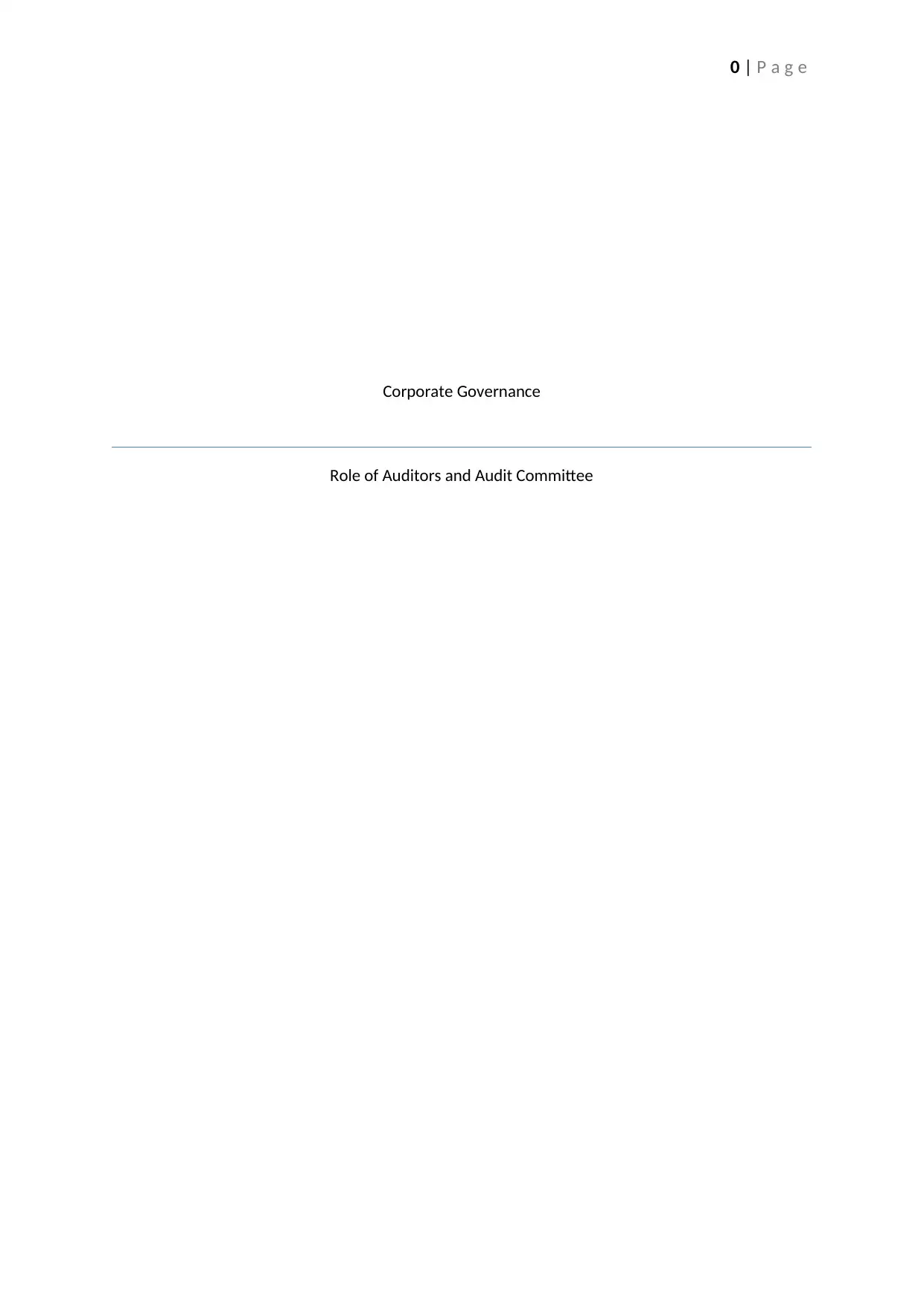
0 | P a g e
Corporate Governance
Role of Auditors and Audit Committee
Corporate Governance
Role of Auditors and Audit Committee
Paraphrase This Document
Need a fresh take? Get an instant paraphrase of this document with our AI Paraphraser
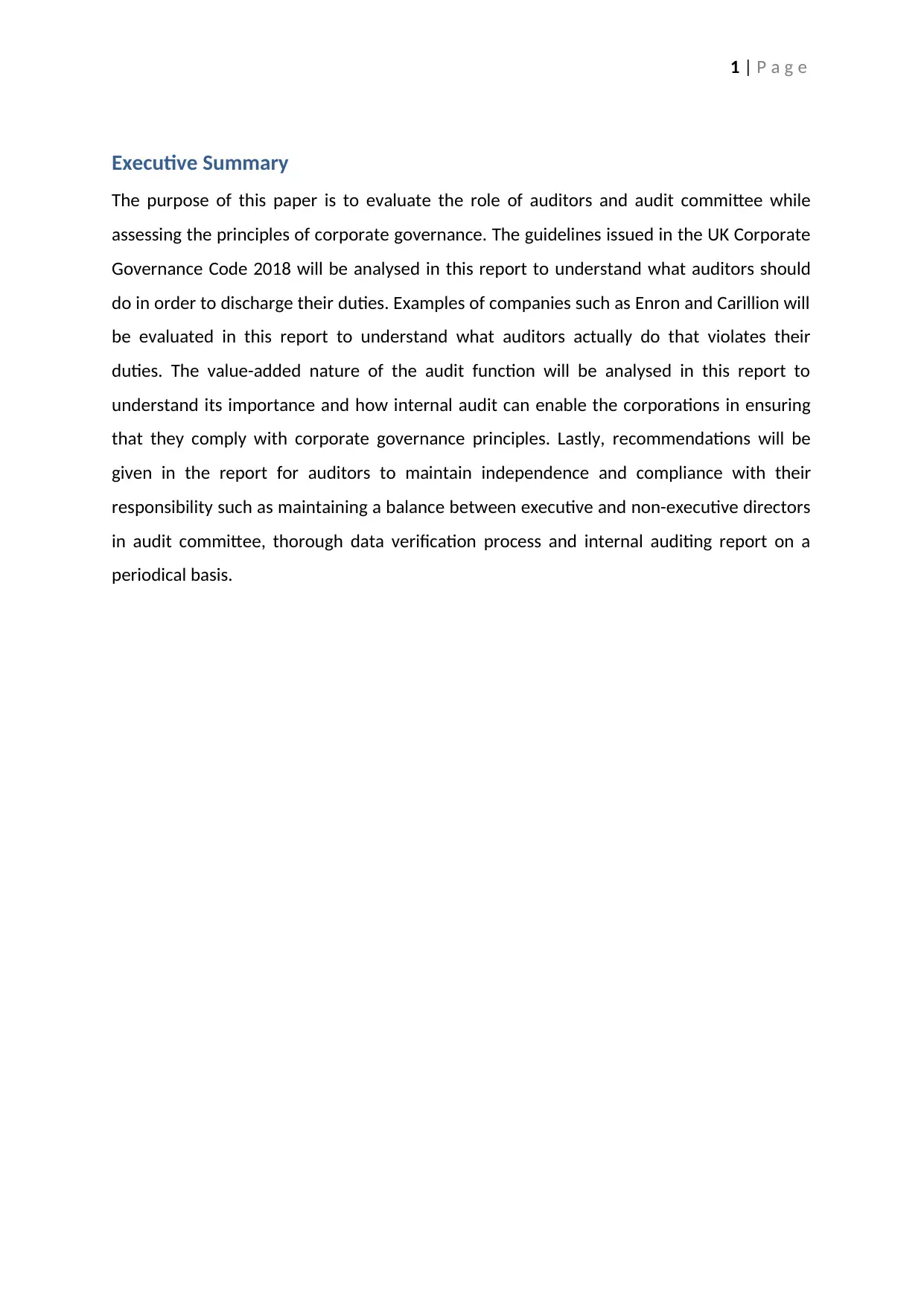
1 | P a g e
Executive Summary
The purpose of this paper is to evaluate the role of auditors and audit committee while
assessing the principles of corporate governance. The guidelines issued in the UK Corporate
Governance Code 2018 will be analysed in this report to understand what auditors should
do in order to discharge their duties. Examples of companies such as Enron and Carillion will
be evaluated in this report to understand what auditors actually do that violates their
duties. The value-added nature of the audit function will be analysed in this report to
understand its importance and how internal audit can enable the corporations in ensuring
that they comply with corporate governance principles. Lastly, recommendations will be
given in the report for auditors to maintain independence and compliance with their
responsibility such as maintaining a balance between executive and non-executive directors
in audit committee, thorough data verification process and internal auditing report on a
periodical basis.
Executive Summary
The purpose of this paper is to evaluate the role of auditors and audit committee while
assessing the principles of corporate governance. The guidelines issued in the UK Corporate
Governance Code 2018 will be analysed in this report to understand what auditors should
do in order to discharge their duties. Examples of companies such as Enron and Carillion will
be evaluated in this report to understand what auditors actually do that violates their
duties. The value-added nature of the audit function will be analysed in this report to
understand its importance and how internal audit can enable the corporations in ensuring
that they comply with corporate governance principles. Lastly, recommendations will be
given in the report for auditors to maintain independence and compliance with their
responsibility such as maintaining a balance between executive and non-executive directors
in audit committee, thorough data verification process and internal auditing report on a
periodical basis.
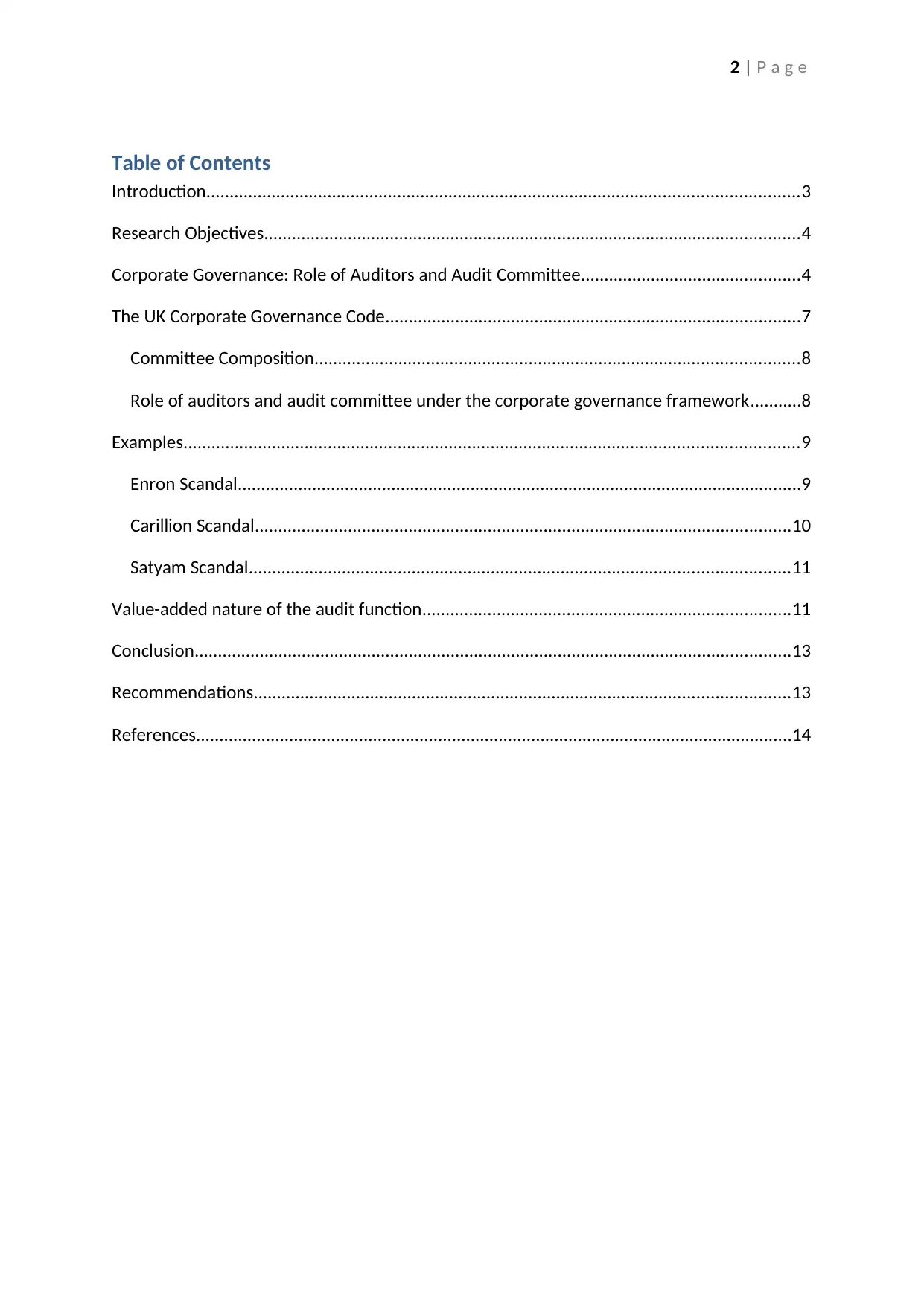
2 | P a g e
Table of Contents
Introduction...............................................................................................................................3
Research Objectives...................................................................................................................4
Corporate Governance: Role of Auditors and Audit Committee...............................................4
The UK Corporate Governance Code.........................................................................................7
Committee Composition........................................................................................................8
Role of auditors and audit committee under the corporate governance framework...........8
Examples....................................................................................................................................9
Enron Scandal.........................................................................................................................9
Carillion Scandal...................................................................................................................10
Satyam Scandal....................................................................................................................11
Value-added nature of the audit function...............................................................................11
Conclusion................................................................................................................................13
Recommendations...................................................................................................................13
References................................................................................................................................14
Table of Contents
Introduction...............................................................................................................................3
Research Objectives...................................................................................................................4
Corporate Governance: Role of Auditors and Audit Committee...............................................4
The UK Corporate Governance Code.........................................................................................7
Committee Composition........................................................................................................8
Role of auditors and audit committee under the corporate governance framework...........8
Examples....................................................................................................................................9
Enron Scandal.........................................................................................................................9
Carillion Scandal...................................................................................................................10
Satyam Scandal....................................................................................................................11
Value-added nature of the audit function...............................................................................11
Conclusion................................................................................................................................13
Recommendations...................................................................................................................13
References................................................................................................................................14
⊘ This is a preview!⊘
Do you want full access?
Subscribe today to unlock all pages.

Trusted by 1+ million students worldwide
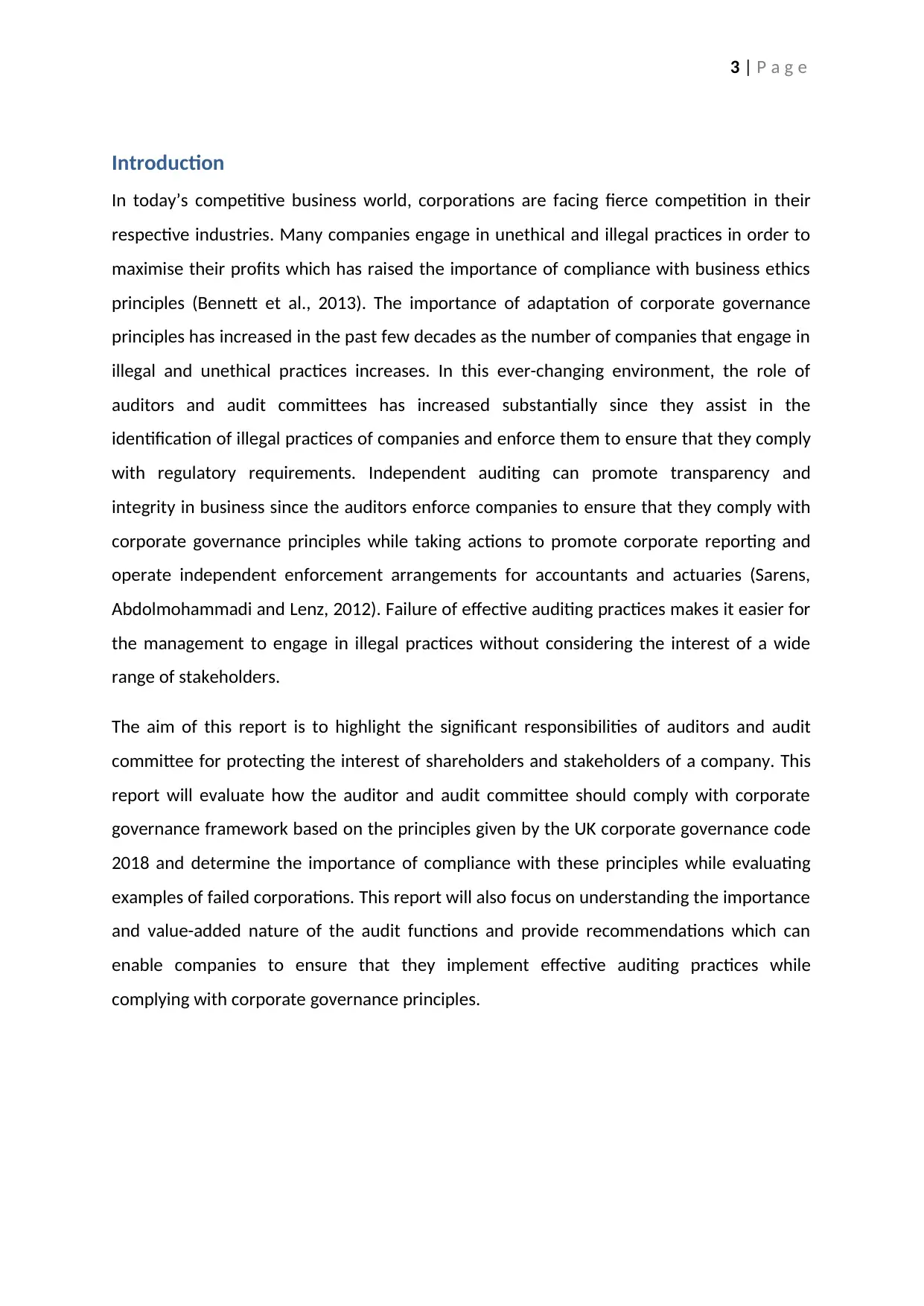
3 | P a g e
Introduction
In today’s competitive business world, corporations are facing fierce competition in their
respective industries. Many companies engage in unethical and illegal practices in order to
maximise their profits which has raised the importance of compliance with business ethics
principles (Bennett et al., 2013). The importance of adaptation of corporate governance
principles has increased in the past few decades as the number of companies that engage in
illegal and unethical practices increases. In this ever-changing environment, the role of
auditors and audit committees has increased substantially since they assist in the
identification of illegal practices of companies and enforce them to ensure that they comply
with regulatory requirements. Independent auditing can promote transparency and
integrity in business since the auditors enforce companies to ensure that they comply with
corporate governance principles while taking actions to promote corporate reporting and
operate independent enforcement arrangements for accountants and actuaries (Sarens,
Abdolmohammadi and Lenz, 2012). Failure of effective auditing practices makes it easier for
the management to engage in illegal practices without considering the interest of a wide
range of stakeholders.
The aim of this report is to highlight the significant responsibilities of auditors and audit
committee for protecting the interest of shareholders and stakeholders of a company. This
report will evaluate how the auditor and audit committee should comply with corporate
governance framework based on the principles given by the UK corporate governance code
2018 and determine the importance of compliance with these principles while evaluating
examples of failed corporations. This report will also focus on understanding the importance
and value-added nature of the audit functions and provide recommendations which can
enable companies to ensure that they implement effective auditing practices while
complying with corporate governance principles.
Introduction
In today’s competitive business world, corporations are facing fierce competition in their
respective industries. Many companies engage in unethical and illegal practices in order to
maximise their profits which has raised the importance of compliance with business ethics
principles (Bennett et al., 2013). The importance of adaptation of corporate governance
principles has increased in the past few decades as the number of companies that engage in
illegal and unethical practices increases. In this ever-changing environment, the role of
auditors and audit committees has increased substantially since they assist in the
identification of illegal practices of companies and enforce them to ensure that they comply
with regulatory requirements. Independent auditing can promote transparency and
integrity in business since the auditors enforce companies to ensure that they comply with
corporate governance principles while taking actions to promote corporate reporting and
operate independent enforcement arrangements for accountants and actuaries (Sarens,
Abdolmohammadi and Lenz, 2012). Failure of effective auditing practices makes it easier for
the management to engage in illegal practices without considering the interest of a wide
range of stakeholders.
The aim of this report is to highlight the significant responsibilities of auditors and audit
committee for protecting the interest of shareholders and stakeholders of a company. This
report will evaluate how the auditor and audit committee should comply with corporate
governance framework based on the principles given by the UK corporate governance code
2018 and determine the importance of compliance with these principles while evaluating
examples of failed corporations. This report will also focus on understanding the importance
and value-added nature of the audit functions and provide recommendations which can
enable companies to ensure that they implement effective auditing practices while
complying with corporate governance principles.
Paraphrase This Document
Need a fresh take? Get an instant paraphrase of this document with our AI Paraphraser
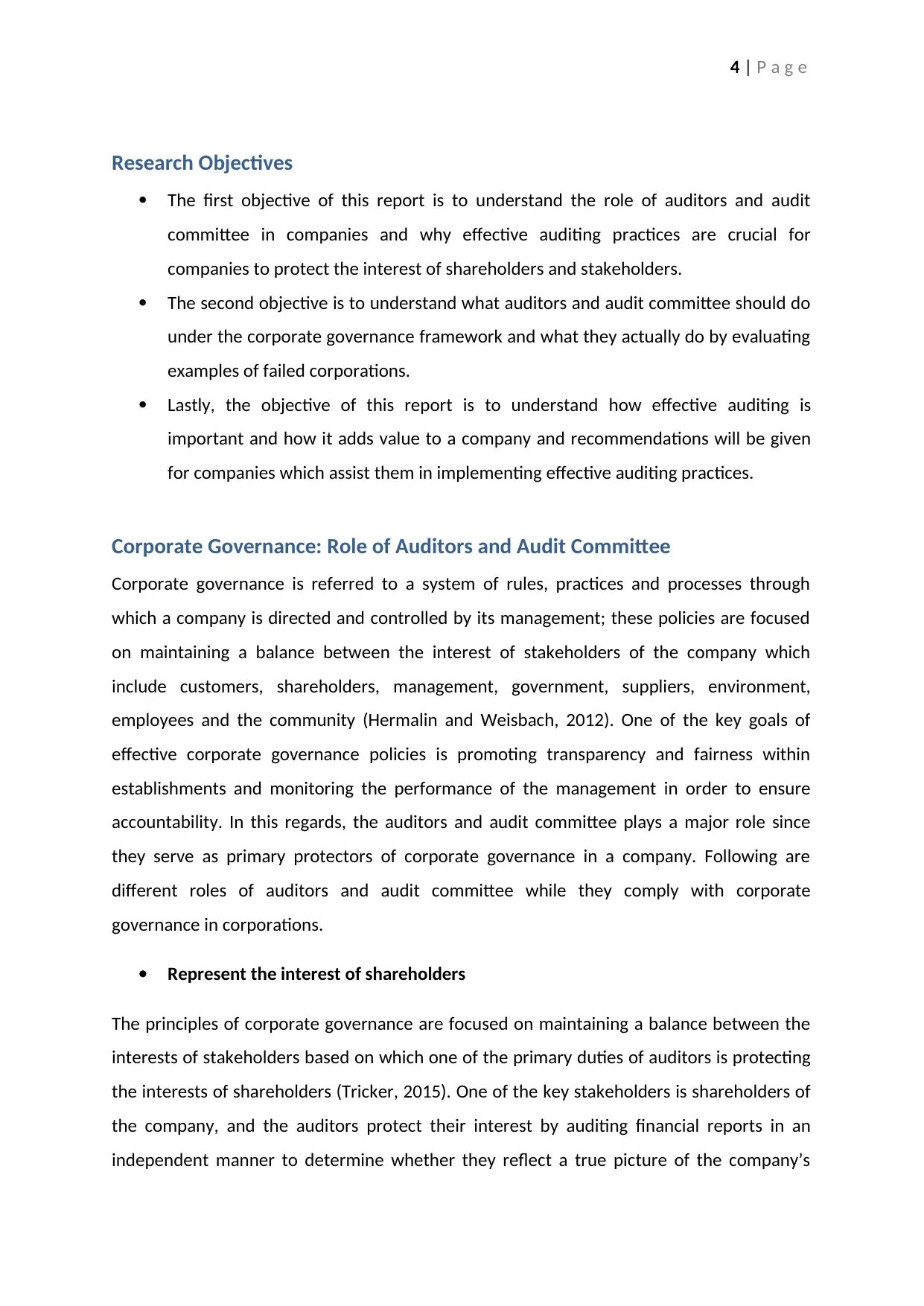
4 | P a g e
Research Objectives
The first objective of this report is to understand the role of auditors and audit
committee in companies and why effective auditing practices are crucial for
companies to protect the interest of shareholders and stakeholders.
The second objective is to understand what auditors and audit committee should do
under the corporate governance framework and what they actually do by evaluating
examples of failed corporations.
Lastly, the objective of this report is to understand how effective auditing is
important and how it adds value to a company and recommendations will be given
for companies which assist them in implementing effective auditing practices.
Corporate Governance: Role of Auditors and Audit Committee
Corporate governance is referred to a system of rules, practices and processes through
which a company is directed and controlled by its management; these policies are focused
on maintaining a balance between the interest of stakeholders of the company which
include customers, shareholders, management, government, suppliers, environment,
employees and the community (Hermalin and Weisbach, 2012). One of the key goals of
effective corporate governance policies is promoting transparency and fairness within
establishments and monitoring the performance of the management in order to ensure
accountability. In this regards, the auditors and audit committee plays a major role since
they serve as primary protectors of corporate governance in a company. Following are
different roles of auditors and audit committee while they comply with corporate
governance in corporations.
Represent the interest of shareholders
The principles of corporate governance are focused on maintaining a balance between the
interests of stakeholders based on which one of the primary duties of auditors is protecting
the interests of shareholders (Tricker, 2015). One of the key stakeholders is shareholders of
the company, and the auditors protect their interest by auditing financial reports in an
independent manner to determine whether they reflect a true picture of the company’s
Research Objectives
The first objective of this report is to understand the role of auditors and audit
committee in companies and why effective auditing practices are crucial for
companies to protect the interest of shareholders and stakeholders.
The second objective is to understand what auditors and audit committee should do
under the corporate governance framework and what they actually do by evaluating
examples of failed corporations.
Lastly, the objective of this report is to understand how effective auditing is
important and how it adds value to a company and recommendations will be given
for companies which assist them in implementing effective auditing practices.
Corporate Governance: Role of Auditors and Audit Committee
Corporate governance is referred to a system of rules, practices and processes through
which a company is directed and controlled by its management; these policies are focused
on maintaining a balance between the interest of stakeholders of the company which
include customers, shareholders, management, government, suppliers, environment,
employees and the community (Hermalin and Weisbach, 2012). One of the key goals of
effective corporate governance policies is promoting transparency and fairness within
establishments and monitoring the performance of the management in order to ensure
accountability. In this regards, the auditors and audit committee plays a major role since
they serve as primary protectors of corporate governance in a company. Following are
different roles of auditors and audit committee while they comply with corporate
governance in corporations.
Represent the interest of shareholders
The principles of corporate governance are focused on maintaining a balance between the
interests of stakeholders based on which one of the primary duties of auditors is protecting
the interests of shareholders (Tricker, 2015). One of the key stakeholders is shareholders of
the company, and the auditors protect their interest by auditing financial reports in an
independent manner to determine whether they reflect a true picture of the company’s
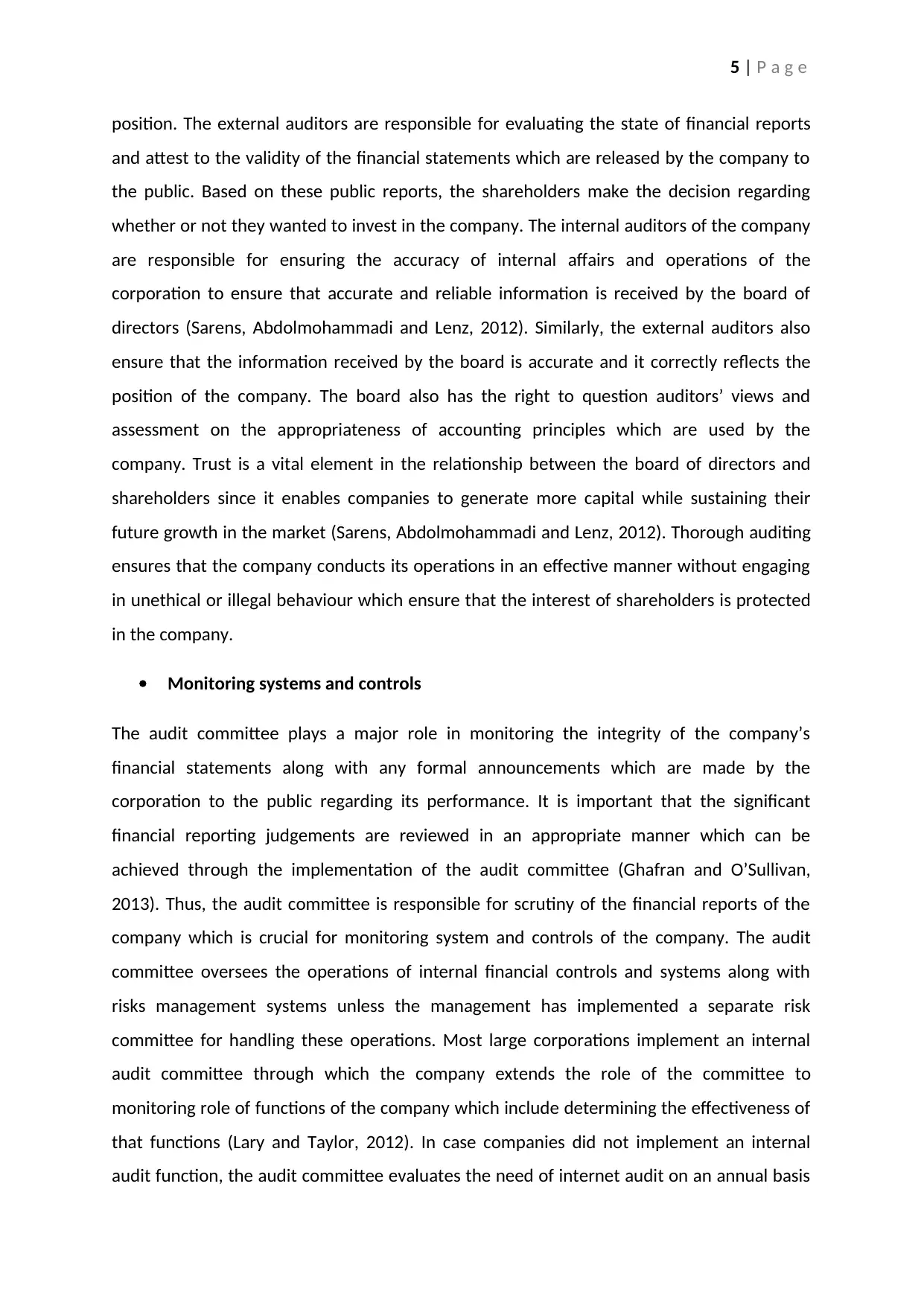
5 | P a g e
position. The external auditors are responsible for evaluating the state of financial reports
and attest to the validity of the financial statements which are released by the company to
the public. Based on these public reports, the shareholders make the decision regarding
whether or not they wanted to invest in the company. The internal auditors of the company
are responsible for ensuring the accuracy of internal affairs and operations of the
corporation to ensure that accurate and reliable information is received by the board of
directors (Sarens, Abdolmohammadi and Lenz, 2012). Similarly, the external auditors also
ensure that the information received by the board is accurate and it correctly reflects the
position of the company. The board also has the right to question auditors’ views and
assessment on the appropriateness of accounting principles which are used by the
company. Trust is a vital element in the relationship between the board of directors and
shareholders since it enables companies to generate more capital while sustaining their
future growth in the market (Sarens, Abdolmohammadi and Lenz, 2012). Thorough auditing
ensures that the company conducts its operations in an effective manner without engaging
in unethical or illegal behaviour which ensure that the interest of shareholders is protected
in the company.
Monitoring systems and controls
The audit committee plays a major role in monitoring the integrity of the company’s
financial statements along with any formal announcements which are made by the
corporation to the public regarding its performance. It is important that the significant
financial reporting judgements are reviewed in an appropriate manner which can be
achieved through the implementation of the audit committee (Ghafran and O’Sullivan,
2013). Thus, the audit committee is responsible for scrutiny of the financial reports of the
company which is crucial for monitoring system and controls of the company. The audit
committee oversees the operations of internal financial controls and systems along with
risks management systems unless the management has implemented a separate risk
committee for handling these operations. Most large corporations implement an internal
audit committee through which the company extends the role of the committee to
monitoring role of functions of the company which include determining the effectiveness of
that functions (Lary and Taylor, 2012). In case companies did not implement an internal
audit function, the audit committee evaluates the need of internet audit on an annual basis
position. The external auditors are responsible for evaluating the state of financial reports
and attest to the validity of the financial statements which are released by the company to
the public. Based on these public reports, the shareholders make the decision regarding
whether or not they wanted to invest in the company. The internal auditors of the company
are responsible for ensuring the accuracy of internal affairs and operations of the
corporation to ensure that accurate and reliable information is received by the board of
directors (Sarens, Abdolmohammadi and Lenz, 2012). Similarly, the external auditors also
ensure that the information received by the board is accurate and it correctly reflects the
position of the company. The board also has the right to question auditors’ views and
assessment on the appropriateness of accounting principles which are used by the
company. Trust is a vital element in the relationship between the board of directors and
shareholders since it enables companies to generate more capital while sustaining their
future growth in the market (Sarens, Abdolmohammadi and Lenz, 2012). Thorough auditing
ensures that the company conducts its operations in an effective manner without engaging
in unethical or illegal behaviour which ensure that the interest of shareholders is protected
in the company.
Monitoring systems and controls
The audit committee plays a major role in monitoring the integrity of the company’s
financial statements along with any formal announcements which are made by the
corporation to the public regarding its performance. It is important that the significant
financial reporting judgements are reviewed in an appropriate manner which can be
achieved through the implementation of the audit committee (Ghafran and O’Sullivan,
2013). Thus, the audit committee is responsible for scrutiny of the financial reports of the
company which is crucial for monitoring system and controls of the company. The audit
committee oversees the operations of internal financial controls and systems along with
risks management systems unless the management has implemented a separate risk
committee for handling these operations. Most large corporations implement an internal
audit committee through which the company extends the role of the committee to
monitoring role of functions of the company which include determining the effectiveness of
that functions (Lary and Taylor, 2012). In case companies did not implement an internal
audit function, the audit committee evaluates the need of internet audit on an annual basis
⊘ This is a preview!⊘
Do you want full access?
Subscribe today to unlock all pages.

Trusted by 1+ million students worldwide
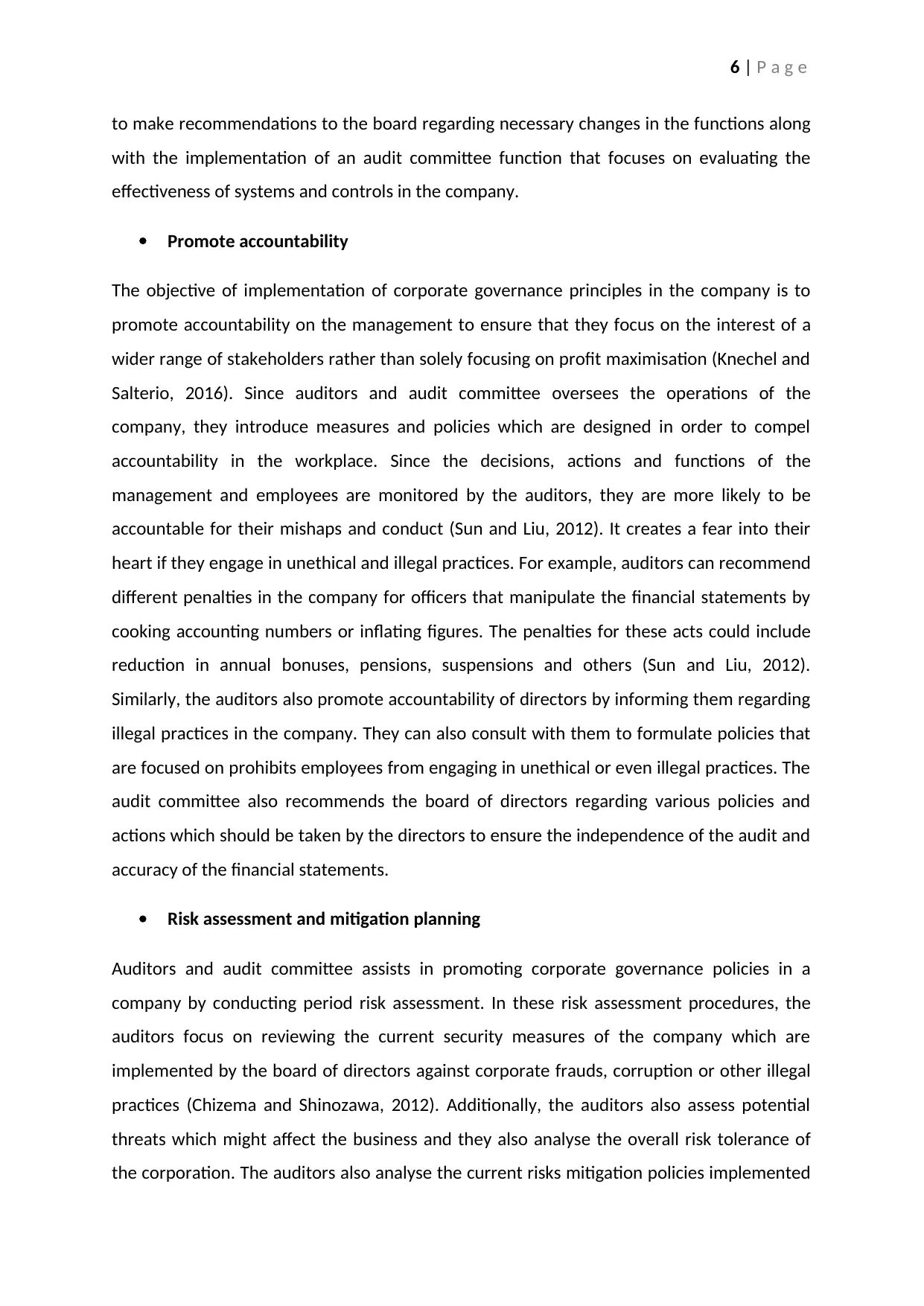
6 | P a g e
to make recommendations to the board regarding necessary changes in the functions along
with the implementation of an audit committee function that focuses on evaluating the
effectiveness of systems and controls in the company.
Promote accountability
The objective of implementation of corporate governance principles in the company is to
promote accountability on the management to ensure that they focus on the interest of a
wider range of stakeholders rather than solely focusing on profit maximisation (Knechel and
Salterio, 2016). Since auditors and audit committee oversees the operations of the
company, they introduce measures and policies which are designed in order to compel
accountability in the workplace. Since the decisions, actions and functions of the
management and employees are monitored by the auditors, they are more likely to be
accountable for their mishaps and conduct (Sun and Liu, 2012). It creates a fear into their
heart if they engage in unethical and illegal practices. For example, auditors can recommend
different penalties in the company for officers that manipulate the financial statements by
cooking accounting numbers or inflating figures. The penalties for these acts could include
reduction in annual bonuses, pensions, suspensions and others (Sun and Liu, 2012).
Similarly, the auditors also promote accountability of directors by informing them regarding
illegal practices in the company. They can also consult with them to formulate policies that
are focused on prohibits employees from engaging in unethical or even illegal practices. The
audit committee also recommends the board of directors regarding various policies and
actions which should be taken by the directors to ensure the independence of the audit and
accuracy of the financial statements.
Risk assessment and mitigation planning
Auditors and audit committee assists in promoting corporate governance policies in a
company by conducting period risk assessment. In these risk assessment procedures, the
auditors focus on reviewing the current security measures of the company which are
implemented by the board of directors against corporate frauds, corruption or other illegal
practices (Chizema and Shinozawa, 2012). Additionally, the auditors also assess potential
threats which might affect the business and they also analyse the overall risk tolerance of
the corporation. The auditors also analyse the current risks mitigation policies implemented
to make recommendations to the board regarding necessary changes in the functions along
with the implementation of an audit committee function that focuses on evaluating the
effectiveness of systems and controls in the company.
Promote accountability
The objective of implementation of corporate governance principles in the company is to
promote accountability on the management to ensure that they focus on the interest of a
wider range of stakeholders rather than solely focusing on profit maximisation (Knechel and
Salterio, 2016). Since auditors and audit committee oversees the operations of the
company, they introduce measures and policies which are designed in order to compel
accountability in the workplace. Since the decisions, actions and functions of the
management and employees are monitored by the auditors, they are more likely to be
accountable for their mishaps and conduct (Sun and Liu, 2012). It creates a fear into their
heart if they engage in unethical and illegal practices. For example, auditors can recommend
different penalties in the company for officers that manipulate the financial statements by
cooking accounting numbers or inflating figures. The penalties for these acts could include
reduction in annual bonuses, pensions, suspensions and others (Sun and Liu, 2012).
Similarly, the auditors also promote accountability of directors by informing them regarding
illegal practices in the company. They can also consult with them to formulate policies that
are focused on prohibits employees from engaging in unethical or even illegal practices. The
audit committee also recommends the board of directors regarding various policies and
actions which should be taken by the directors to ensure the independence of the audit and
accuracy of the financial statements.
Risk assessment and mitigation planning
Auditors and audit committee assists in promoting corporate governance policies in a
company by conducting period risk assessment. In these risk assessment procedures, the
auditors focus on reviewing the current security measures of the company which are
implemented by the board of directors against corporate frauds, corruption or other illegal
practices (Chizema and Shinozawa, 2012). Additionally, the auditors also assess potential
threats which might affect the business and they also analyse the overall risk tolerance of
the corporation. The auditors also analyse the current risks mitigation policies implemented
Paraphrase This Document
Need a fresh take? Get an instant paraphrase of this document with our AI Paraphraser
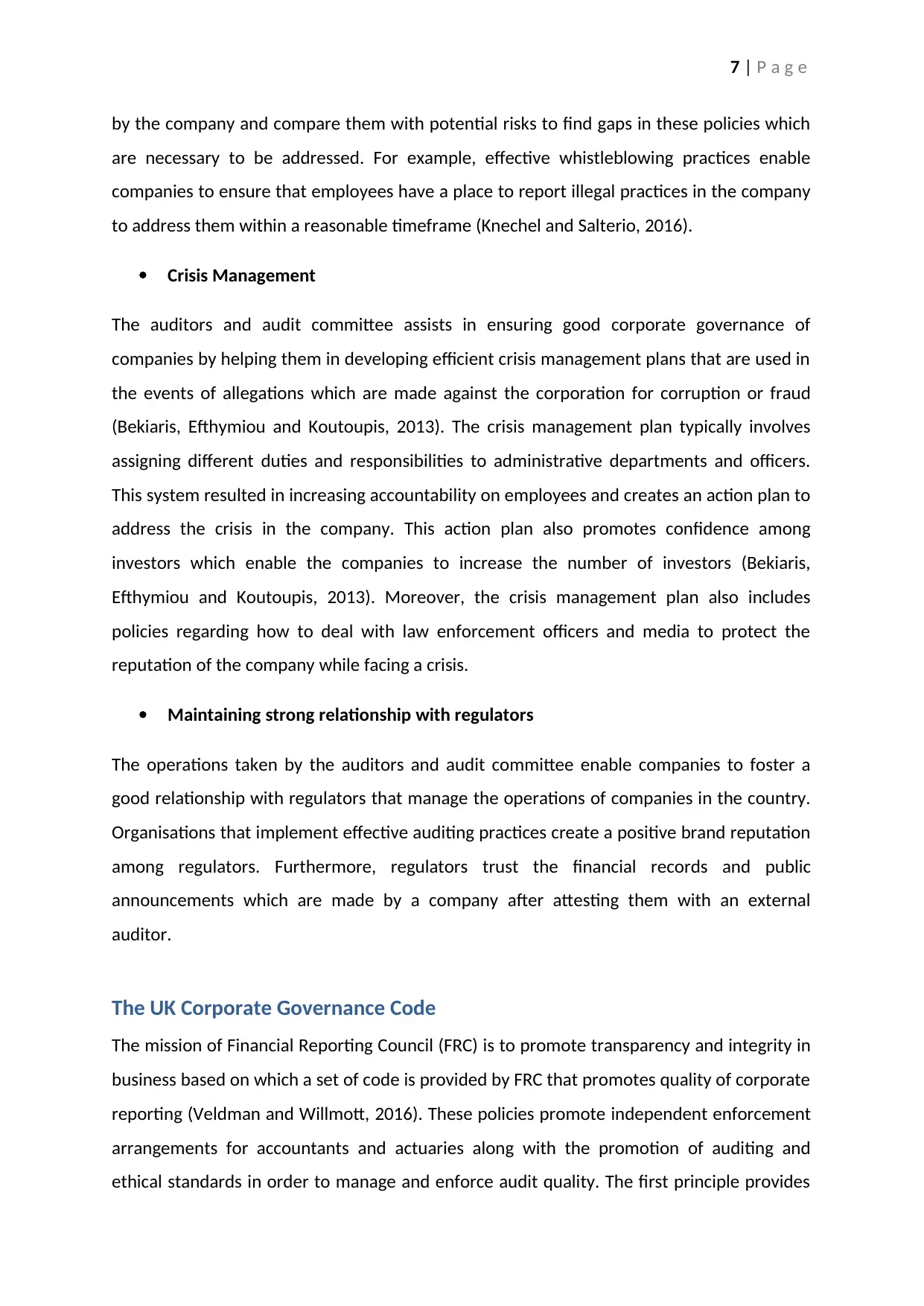
7 | P a g e
by the company and compare them with potential risks to find gaps in these policies which
are necessary to be addressed. For example, effective whistleblowing practices enable
companies to ensure that employees have a place to report illegal practices in the company
to address them within a reasonable timeframe (Knechel and Salterio, 2016).
Crisis Management
The auditors and audit committee assists in ensuring good corporate governance of
companies by helping them in developing efficient crisis management plans that are used in
the events of allegations which are made against the corporation for corruption or fraud
(Bekiaris, Efthymiou and Koutoupis, 2013). The crisis management plan typically involves
assigning different duties and responsibilities to administrative departments and officers.
This system resulted in increasing accountability on employees and creates an action plan to
address the crisis in the company. This action plan also promotes confidence among
investors which enable the companies to increase the number of investors (Bekiaris,
Efthymiou and Koutoupis, 2013). Moreover, the crisis management plan also includes
policies regarding how to deal with law enforcement officers and media to protect the
reputation of the company while facing a crisis.
Maintaining strong relationship with regulators
The operations taken by the auditors and audit committee enable companies to foster a
good relationship with regulators that manage the operations of companies in the country.
Organisations that implement effective auditing practices create a positive brand reputation
among regulators. Furthermore, regulators trust the financial records and public
announcements which are made by a company after attesting them with an external
auditor.
The UK Corporate Governance Code
The mission of Financial Reporting Council (FRC) is to promote transparency and integrity in
business based on which a set of code is provided by FRC that promotes quality of corporate
reporting (Veldman and Willmott, 2016). These policies promote independent enforcement
arrangements for accountants and actuaries along with the promotion of auditing and
ethical standards in order to manage and enforce audit quality. The first principle provides
by the company and compare them with potential risks to find gaps in these policies which
are necessary to be addressed. For example, effective whistleblowing practices enable
companies to ensure that employees have a place to report illegal practices in the company
to address them within a reasonable timeframe (Knechel and Salterio, 2016).
Crisis Management
The auditors and audit committee assists in ensuring good corporate governance of
companies by helping them in developing efficient crisis management plans that are used in
the events of allegations which are made against the corporation for corruption or fraud
(Bekiaris, Efthymiou and Koutoupis, 2013). The crisis management plan typically involves
assigning different duties and responsibilities to administrative departments and officers.
This system resulted in increasing accountability on employees and creates an action plan to
address the crisis in the company. This action plan also promotes confidence among
investors which enable the companies to increase the number of investors (Bekiaris,
Efthymiou and Koutoupis, 2013). Moreover, the crisis management plan also includes
policies regarding how to deal with law enforcement officers and media to protect the
reputation of the company while facing a crisis.
Maintaining strong relationship with regulators
The operations taken by the auditors and audit committee enable companies to foster a
good relationship with regulators that manage the operations of companies in the country.
Organisations that implement effective auditing practices create a positive brand reputation
among regulators. Furthermore, regulators trust the financial records and public
announcements which are made by a company after attesting them with an external
auditor.
The UK Corporate Governance Code
The mission of Financial Reporting Council (FRC) is to promote transparency and integrity in
business based on which a set of code is provided by FRC that promotes quality of corporate
reporting (Veldman and Willmott, 2016). These policies promote independent enforcement
arrangements for accountants and actuaries along with the promotion of auditing and
ethical standards in order to manage and enforce audit quality. The first principle provides
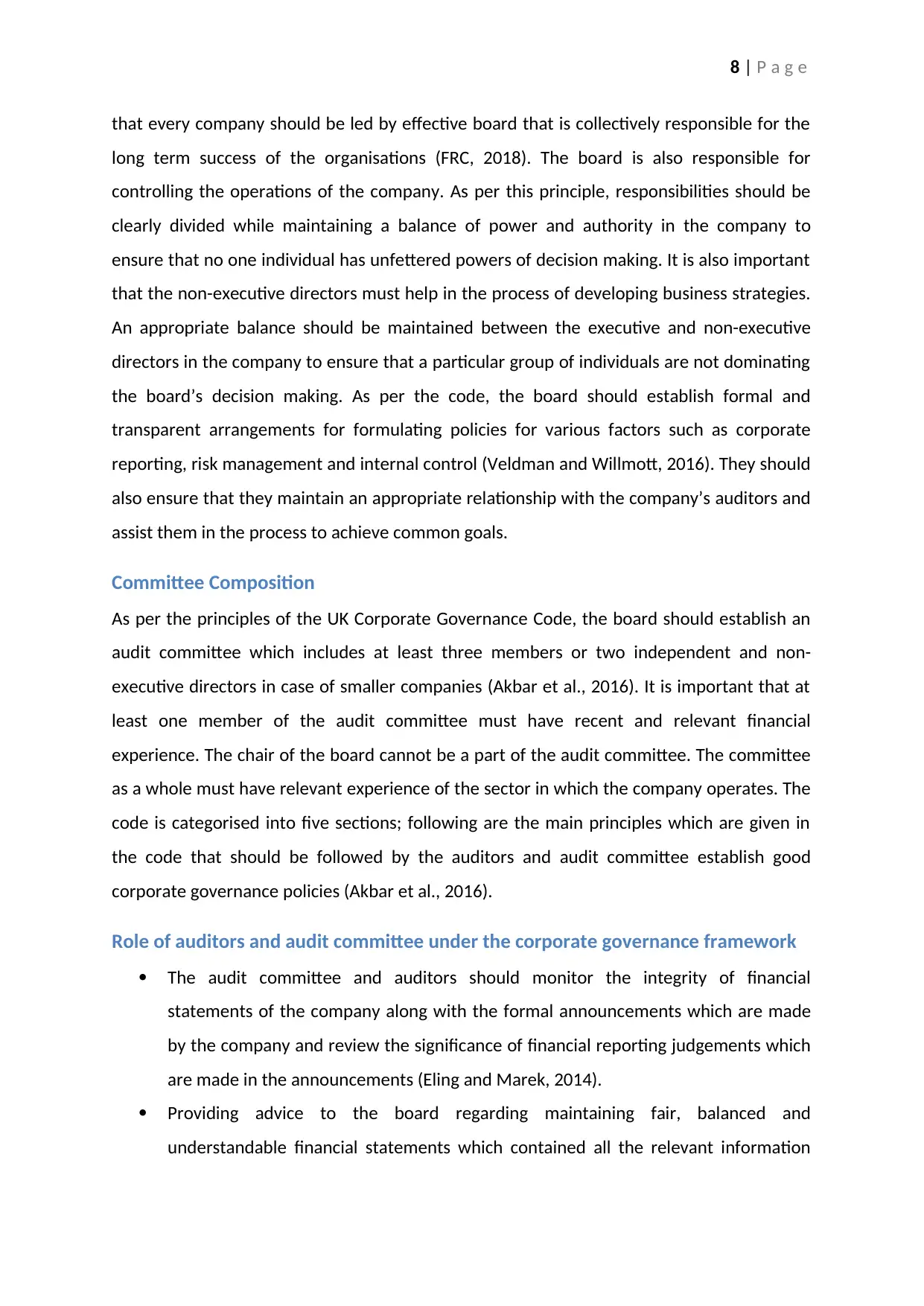
8 | P a g e
that every company should be led by effective board that is collectively responsible for the
long term success of the organisations (FRC, 2018). The board is also responsible for
controlling the operations of the company. As per this principle, responsibilities should be
clearly divided while maintaining a balance of power and authority in the company to
ensure that no one individual has unfettered powers of decision making. It is also important
that the non-executive directors must help in the process of developing business strategies.
An appropriate balance should be maintained between the executive and non-executive
directors in the company to ensure that a particular group of individuals are not dominating
the board’s decision making. As per the code, the board should establish formal and
transparent arrangements for formulating policies for various factors such as corporate
reporting, risk management and internal control (Veldman and Willmott, 2016). They should
also ensure that they maintain an appropriate relationship with the company’s auditors and
assist them in the process to achieve common goals.
Committee Composition
As per the principles of the UK Corporate Governance Code, the board should establish an
audit committee which includes at least three members or two independent and non-
executive directors in case of smaller companies (Akbar et al., 2016). It is important that at
least one member of the audit committee must have recent and relevant financial
experience. The chair of the board cannot be a part of the audit committee. The committee
as a whole must have relevant experience of the sector in which the company operates. The
code is categorised into five sections; following are the main principles which are given in
the code that should be followed by the auditors and audit committee establish good
corporate governance policies (Akbar et al., 2016).
Role of auditors and audit committee under the corporate governance framework
The audit committee and auditors should monitor the integrity of financial
statements of the company along with the formal announcements which are made
by the company and review the significance of financial reporting judgements which
are made in the announcements (Eling and Marek, 2014).
Providing advice to the board regarding maintaining fair, balanced and
understandable financial statements which contained all the relevant information
that every company should be led by effective board that is collectively responsible for the
long term success of the organisations (FRC, 2018). The board is also responsible for
controlling the operations of the company. As per this principle, responsibilities should be
clearly divided while maintaining a balance of power and authority in the company to
ensure that no one individual has unfettered powers of decision making. It is also important
that the non-executive directors must help in the process of developing business strategies.
An appropriate balance should be maintained between the executive and non-executive
directors in the company to ensure that a particular group of individuals are not dominating
the board’s decision making. As per the code, the board should establish formal and
transparent arrangements for formulating policies for various factors such as corporate
reporting, risk management and internal control (Veldman and Willmott, 2016). They should
also ensure that they maintain an appropriate relationship with the company’s auditors and
assist them in the process to achieve common goals.
Committee Composition
As per the principles of the UK Corporate Governance Code, the board should establish an
audit committee which includes at least three members or two independent and non-
executive directors in case of smaller companies (Akbar et al., 2016). It is important that at
least one member of the audit committee must have recent and relevant financial
experience. The chair of the board cannot be a part of the audit committee. The committee
as a whole must have relevant experience of the sector in which the company operates. The
code is categorised into five sections; following are the main principles which are given in
the code that should be followed by the auditors and audit committee establish good
corporate governance policies (Akbar et al., 2016).
Role of auditors and audit committee under the corporate governance framework
The audit committee and auditors should monitor the integrity of financial
statements of the company along with the formal announcements which are made
by the company and review the significance of financial reporting judgements which
are made in the announcements (Eling and Marek, 2014).
Providing advice to the board regarding maintaining fair, balanced and
understandable financial statements which contained all the relevant information
⊘ This is a preview!⊘
Do you want full access?
Subscribe today to unlock all pages.

Trusted by 1+ million students worldwide
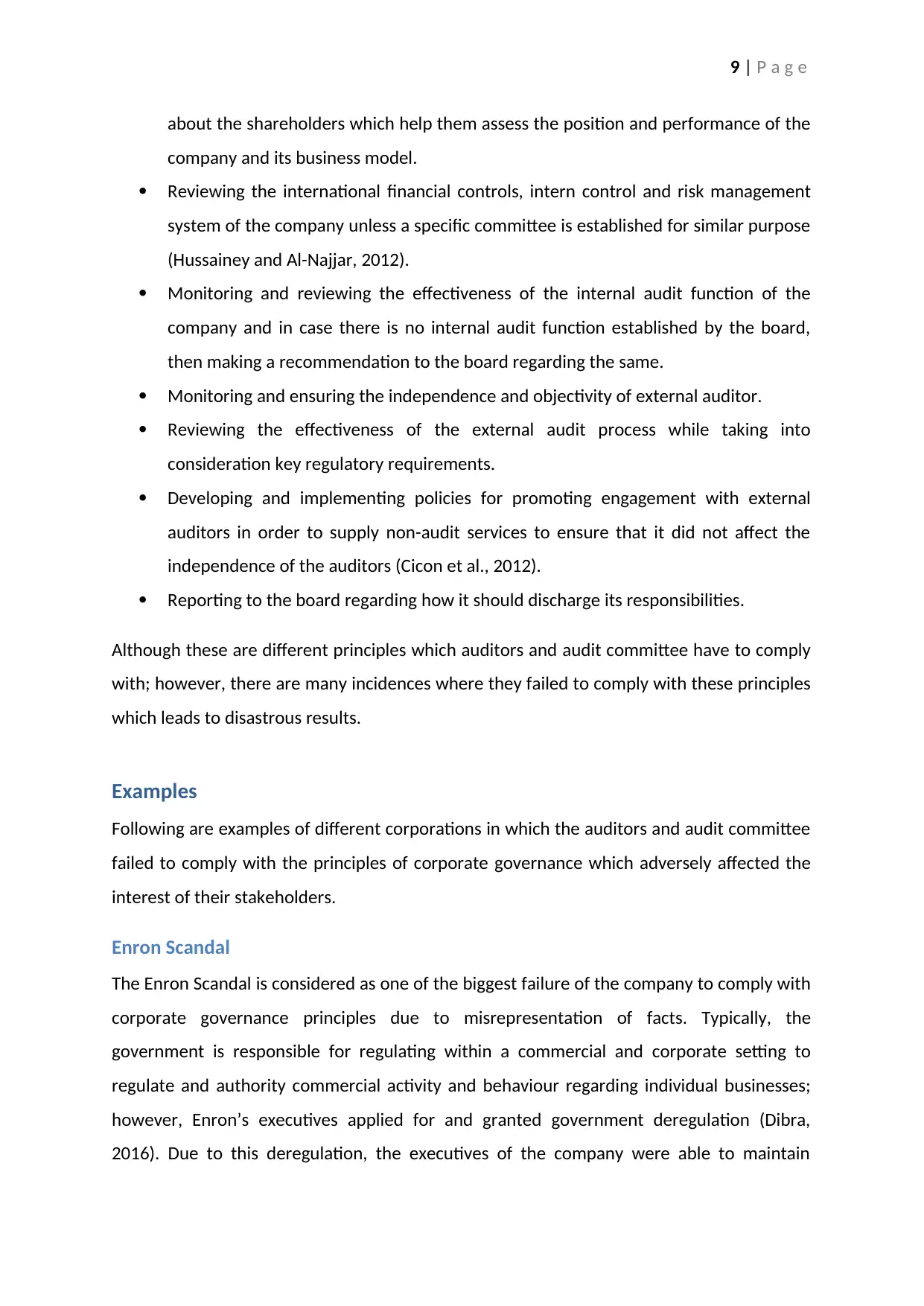
9 | P a g e
about the shareholders which help them assess the position and performance of the
company and its business model.
Reviewing the international financial controls, intern control and risk management
system of the company unless a specific committee is established for similar purpose
(Hussainey and Al-Najjar, 2012).
Monitoring and reviewing the effectiveness of the internal audit function of the
company and in case there is no internal audit function established by the board,
then making a recommendation to the board regarding the same.
Monitoring and ensuring the independence and objectivity of external auditor.
Reviewing the effectiveness of the external audit process while taking into
consideration key regulatory requirements.
Developing and implementing policies for promoting engagement with external
auditors in order to supply non-audit services to ensure that it did not affect the
independence of the auditors (Cicon et al., 2012).
Reporting to the board regarding how it should discharge its responsibilities.
Although these are different principles which auditors and audit committee have to comply
with; however, there are many incidences where they failed to comply with these principles
which leads to disastrous results.
Examples
Following are examples of different corporations in which the auditors and audit committee
failed to comply with the principles of corporate governance which adversely affected the
interest of their stakeholders.
Enron Scandal
The Enron Scandal is considered as one of the biggest failure of the company to comply with
corporate governance principles due to misrepresentation of facts. Typically, the
government is responsible for regulating within a commercial and corporate setting to
regulate and authority commercial activity and behaviour regarding individual businesses;
however, Enron’s executives applied for and granted government deregulation (Dibra,
2016). Due to this deregulation, the executives of the company were able to maintain
about the shareholders which help them assess the position and performance of the
company and its business model.
Reviewing the international financial controls, intern control and risk management
system of the company unless a specific committee is established for similar purpose
(Hussainey and Al-Najjar, 2012).
Monitoring and reviewing the effectiveness of the internal audit function of the
company and in case there is no internal audit function established by the board,
then making a recommendation to the board regarding the same.
Monitoring and ensuring the independence and objectivity of external auditor.
Reviewing the effectiveness of the external audit process while taking into
consideration key regulatory requirements.
Developing and implementing policies for promoting engagement with external
auditors in order to supply non-audit services to ensure that it did not affect the
independence of the auditors (Cicon et al., 2012).
Reporting to the board regarding how it should discharge its responsibilities.
Although these are different principles which auditors and audit committee have to comply
with; however, there are many incidences where they failed to comply with these principles
which leads to disastrous results.
Examples
Following are examples of different corporations in which the auditors and audit committee
failed to comply with the principles of corporate governance which adversely affected the
interest of their stakeholders.
Enron Scandal
The Enron Scandal is considered as one of the biggest failure of the company to comply with
corporate governance principles due to misrepresentation of facts. Typically, the
government is responsible for regulating within a commercial and corporate setting to
regulate and authority commercial activity and behaviour regarding individual businesses;
however, Enron’s executives applied for and granted government deregulation (Dibra,
2016). Due to this deregulation, the executives of the company were able to maintain
Paraphrase This Document
Need a fresh take? Get an instant paraphrase of this document with our AI Paraphraser
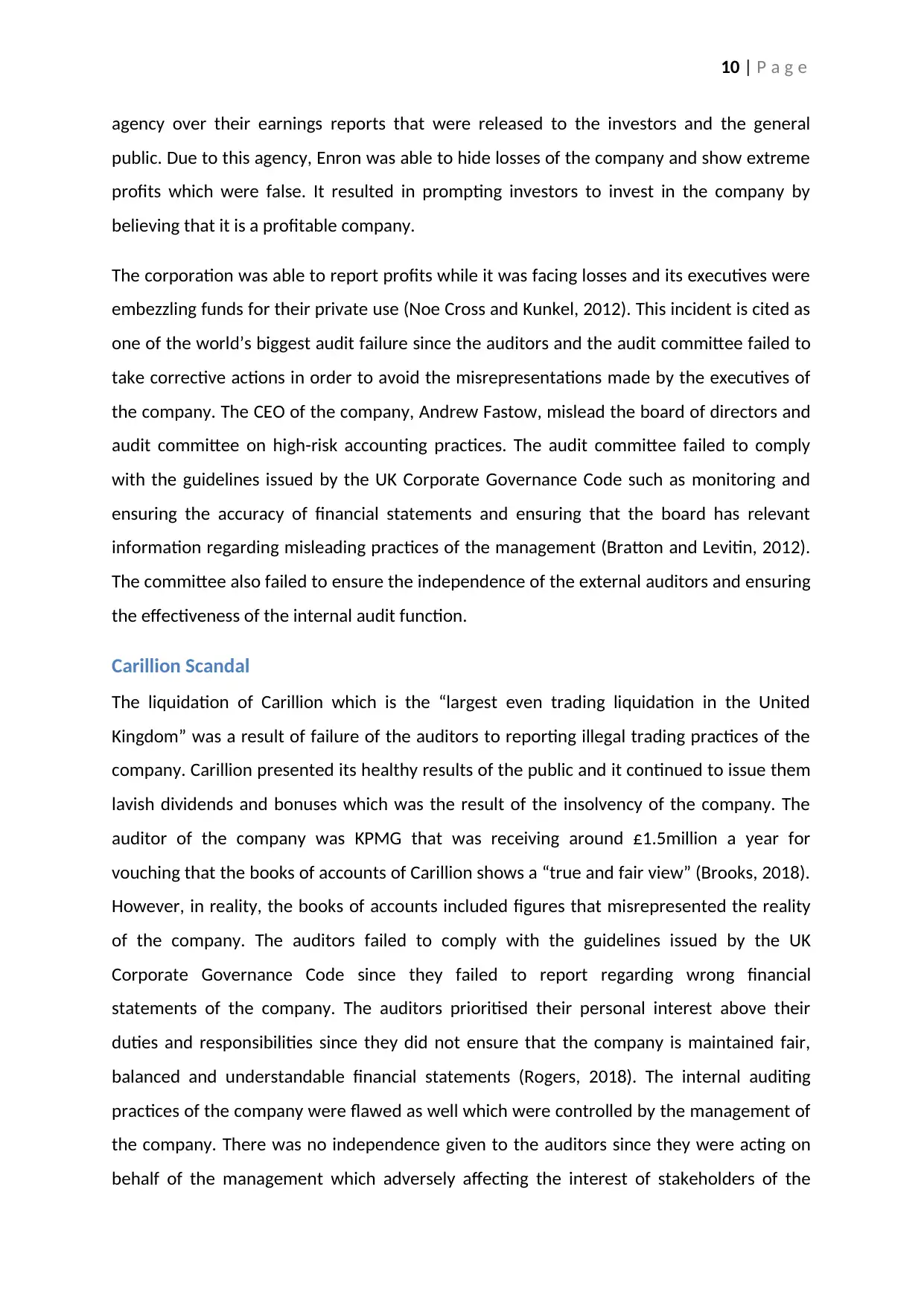
10 | P a g e
agency over their earnings reports that were released to the investors and the general
public. Due to this agency, Enron was able to hide losses of the company and show extreme
profits which were false. It resulted in prompting investors to invest in the company by
believing that it is a profitable company.
The corporation was able to report profits while it was facing losses and its executives were
embezzling funds for their private use (Noe Cross and Kunkel, 2012). This incident is cited as
one of the world’s biggest audit failure since the auditors and the audit committee failed to
take corrective actions in order to avoid the misrepresentations made by the executives of
the company. The CEO of the company, Andrew Fastow, mislead the board of directors and
audit committee on high-risk accounting practices. The audit committee failed to comply
with the guidelines issued by the UK Corporate Governance Code such as monitoring and
ensuring the accuracy of financial statements and ensuring that the board has relevant
information regarding misleading practices of the management (Bratton and Levitin, 2012).
The committee also failed to ensure the independence of the external auditors and ensuring
the effectiveness of the internal audit function.
Carillion Scandal
The liquidation of Carillion which is the “largest even trading liquidation in the United
Kingdom” was a result of failure of the auditors to reporting illegal trading practices of the
company. Carillion presented its healthy results of the public and it continued to issue them
lavish dividends and bonuses which was the result of the insolvency of the company. The
auditor of the company was KPMG that was receiving around £1.5million a year for
vouching that the books of accounts of Carillion shows a “true and fair view” (Brooks, 2018).
However, in reality, the books of accounts included figures that misrepresented the reality
of the company. The auditors failed to comply with the guidelines issued by the UK
Corporate Governance Code since they failed to report regarding wrong financial
statements of the company. The auditors prioritised their personal interest above their
duties and responsibilities since they did not ensure that the company is maintained fair,
balanced and understandable financial statements (Rogers, 2018). The internal auditing
practices of the company were flawed as well which were controlled by the management of
the company. There was no independence given to the auditors since they were acting on
behalf of the management which adversely affecting the interest of stakeholders of the
agency over their earnings reports that were released to the investors and the general
public. Due to this agency, Enron was able to hide losses of the company and show extreme
profits which were false. It resulted in prompting investors to invest in the company by
believing that it is a profitable company.
The corporation was able to report profits while it was facing losses and its executives were
embezzling funds for their private use (Noe Cross and Kunkel, 2012). This incident is cited as
one of the world’s biggest audit failure since the auditors and the audit committee failed to
take corrective actions in order to avoid the misrepresentations made by the executives of
the company. The CEO of the company, Andrew Fastow, mislead the board of directors and
audit committee on high-risk accounting practices. The audit committee failed to comply
with the guidelines issued by the UK Corporate Governance Code such as monitoring and
ensuring the accuracy of financial statements and ensuring that the board has relevant
information regarding misleading practices of the management (Bratton and Levitin, 2012).
The committee also failed to ensure the independence of the external auditors and ensuring
the effectiveness of the internal audit function.
Carillion Scandal
The liquidation of Carillion which is the “largest even trading liquidation in the United
Kingdom” was a result of failure of the auditors to reporting illegal trading practices of the
company. Carillion presented its healthy results of the public and it continued to issue them
lavish dividends and bonuses which was the result of the insolvency of the company. The
auditor of the company was KPMG that was receiving around £1.5million a year for
vouching that the books of accounts of Carillion shows a “true and fair view” (Brooks, 2018).
However, in reality, the books of accounts included figures that misrepresented the reality
of the company. The auditors failed to comply with the guidelines issued by the UK
Corporate Governance Code since they failed to report regarding wrong financial
statements of the company. The auditors prioritised their personal interest above their
duties and responsibilities since they did not ensure that the company is maintained fair,
balanced and understandable financial statements (Rogers, 2018). The internal auditing
practices of the company were flawed as well which were controlled by the management of
the company. There was no independence given to the auditors since they were acting on
behalf of the management which adversely affecting the interest of stakeholders of the
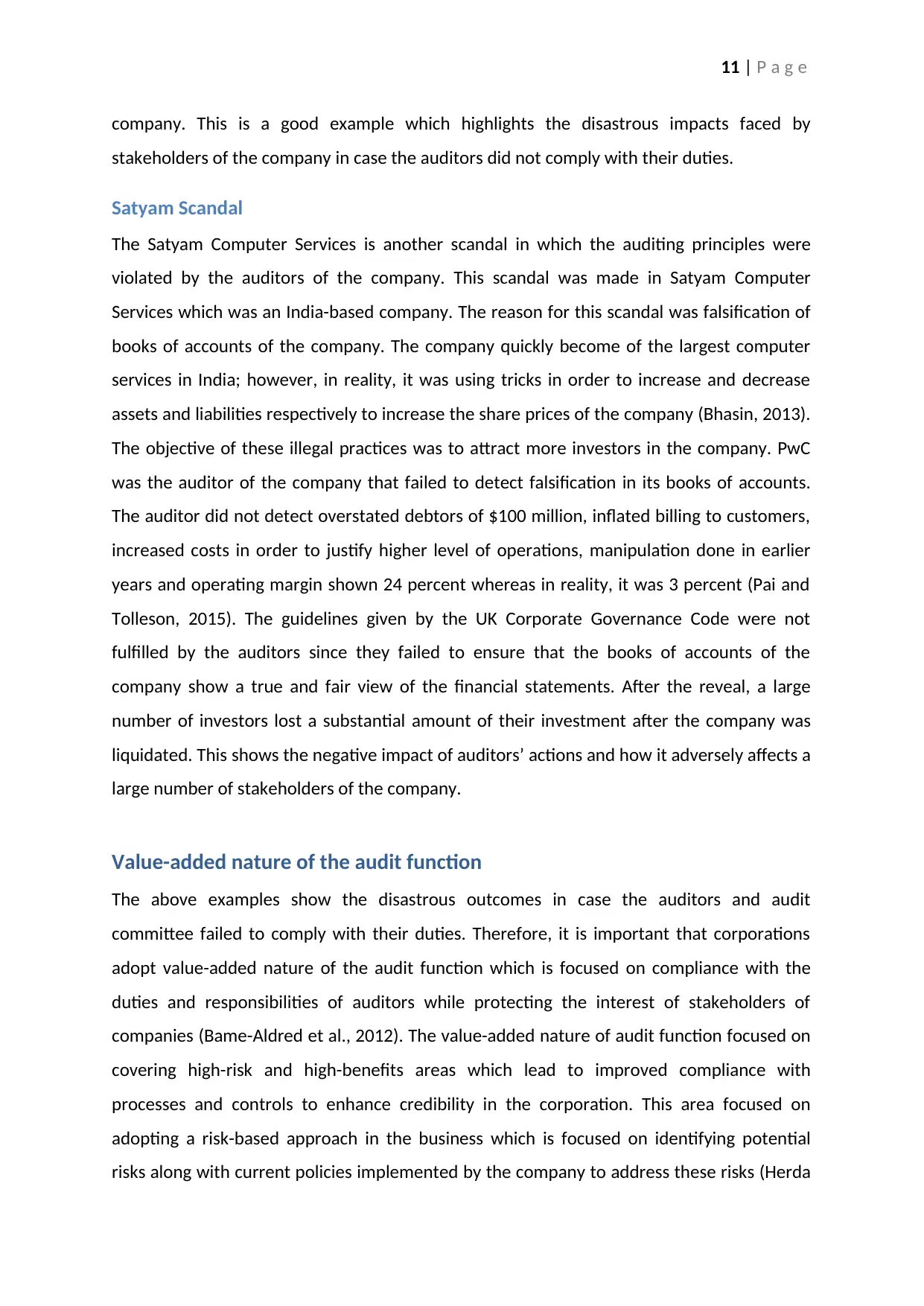
11 | P a g e
company. This is a good example which highlights the disastrous impacts faced by
stakeholders of the company in case the auditors did not comply with their duties.
Satyam Scandal
The Satyam Computer Services is another scandal in which the auditing principles were
violated by the auditors of the company. This scandal was made in Satyam Computer
Services which was an India-based company. The reason for this scandal was falsification of
books of accounts of the company. The company quickly become of the largest computer
services in India; however, in reality, it was using tricks in order to increase and decrease
assets and liabilities respectively to increase the share prices of the company (Bhasin, 2013).
The objective of these illegal practices was to attract more investors in the company. PwC
was the auditor of the company that failed to detect falsification in its books of accounts.
The auditor did not detect overstated debtors of $100 million, inflated billing to customers,
increased costs in order to justify higher level of operations, manipulation done in earlier
years and operating margin shown 24 percent whereas in reality, it was 3 percent (Pai and
Tolleson, 2015). The guidelines given by the UK Corporate Governance Code were not
fulfilled by the auditors since they failed to ensure that the books of accounts of the
company show a true and fair view of the financial statements. After the reveal, a large
number of investors lost a substantial amount of their investment after the company was
liquidated. This shows the negative impact of auditors’ actions and how it adversely affects a
large number of stakeholders of the company.
Value-added nature of the audit function
The above examples show the disastrous outcomes in case the auditors and audit
committee failed to comply with their duties. Therefore, it is important that corporations
adopt value-added nature of the audit function which is focused on compliance with the
duties and responsibilities of auditors while protecting the interest of stakeholders of
companies (Bame-Aldred et al., 2012). The value-added nature of audit function focused on
covering high-risk and high-benefits areas which lead to improved compliance with
processes and controls to enhance credibility in the corporation. This area focused on
adopting a risk-based approach in the business which is focused on identifying potential
risks along with current policies implemented by the company to address these risks (Herda
company. This is a good example which highlights the disastrous impacts faced by
stakeholders of the company in case the auditors did not comply with their duties.
Satyam Scandal
The Satyam Computer Services is another scandal in which the auditing principles were
violated by the auditors of the company. This scandal was made in Satyam Computer
Services which was an India-based company. The reason for this scandal was falsification of
books of accounts of the company. The company quickly become of the largest computer
services in India; however, in reality, it was using tricks in order to increase and decrease
assets and liabilities respectively to increase the share prices of the company (Bhasin, 2013).
The objective of these illegal practices was to attract more investors in the company. PwC
was the auditor of the company that failed to detect falsification in its books of accounts.
The auditor did not detect overstated debtors of $100 million, inflated billing to customers,
increased costs in order to justify higher level of operations, manipulation done in earlier
years and operating margin shown 24 percent whereas in reality, it was 3 percent (Pai and
Tolleson, 2015). The guidelines given by the UK Corporate Governance Code were not
fulfilled by the auditors since they failed to ensure that the books of accounts of the
company show a true and fair view of the financial statements. After the reveal, a large
number of investors lost a substantial amount of their investment after the company was
liquidated. This shows the negative impact of auditors’ actions and how it adversely affects a
large number of stakeholders of the company.
Value-added nature of the audit function
The above examples show the disastrous outcomes in case the auditors and audit
committee failed to comply with their duties. Therefore, it is important that corporations
adopt value-added nature of the audit function which is focused on compliance with the
duties and responsibilities of auditors while protecting the interest of stakeholders of
companies (Bame-Aldred et al., 2012). The value-added nature of audit function focused on
covering high-risk and high-benefits areas which lead to improved compliance with
processes and controls to enhance credibility in the corporation. This area focused on
adopting a risk-based approach in the business which is focused on identifying potential
risks along with current policies implemented by the company to address these risks (Herda
⊘ This is a preview!⊘
Do you want full access?
Subscribe today to unlock all pages.

Trusted by 1+ million students worldwide
1 out of 17
Related Documents
Your All-in-One AI-Powered Toolkit for Academic Success.
+13062052269
info@desklib.com
Available 24*7 on WhatsApp / Email
![[object Object]](/_next/static/media/star-bottom.7253800d.svg)
Unlock your academic potential
Copyright © 2020–2026 A2Z Services. All Rights Reserved. Developed and managed by ZUCOL.





